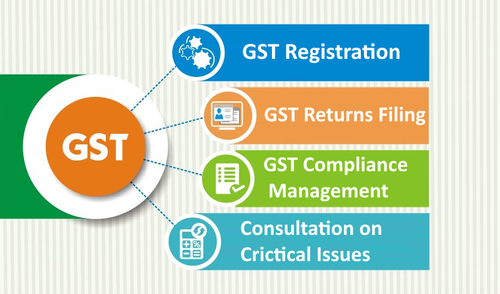The Ultimate Overview to Streamlining the GST Registration Process and Demands for Small Service Owners

Comprehending GST Basics
To realize the fundamentals of the Goods and Provider Tax Obligation (GST) system, small company proprietors must initially comprehend its underlying effects and principles. GST is a value-added tax levied on a lot of items and services for residential usage. It aims to streamline the taxes process by changing multiple indirect tax obligations imposed by the state and main governments. Under the GST regime, organizations are required to sign up and gather tax in support of the federal government, making sure openness and conformity.
Among the essential concepts of GST is input tax credit, which enables companies to declare credit history for tax obligations paid on their acquisitions. This device avoids the plunging effect of tax obligations and advertises efficiency in the tax system. Additionally, GST is a destination-based tax obligation, suggesting that the tax is imposed at the factor of usage instead of the factor of beginning. This guarantees fair circulation of tax obligation income amongst states based on where the services or products are taken in. Comprehending these standard principles is essential for small company owners to navigate the intricacies of the GST system and guarantee compliance with the legislation.
Eligibility Requirements for Enrollment
Having developed a fundamental understanding of GST principles, local business owners have to now satisfy certain eligibility criteria to proceed with the registration process. In India, entities engaged in the supply of products or services with a yearly accumulation turnover exceeding Rs. 40 lakhs (Rs. 10 lakhs for unique group states) are required to sign up for GST. Furthermore, certain services such as those involved in inter-state supply of products, laid-back taxed persons, and those needed to pay tax under the reverse cost device have to sign up for GST irrespective of their turn over. Companies that were signed up under the previous tax routine (BARREL, solution tax obligation, etc) are likewise mandated to register under GST. Farming organizations that just supply produce out of primary production are excluded from GST enrollment. It is important for company owner to thoroughly assess their qualification based upon these standards to make sure conformity with the regulation and prevent any type of fines for non-compliance.
Documents Needed for GST Enrollment

Simplified Registration Refine Actions
Following the collection and confirmation of the requisite papers, the enrollment process for GST can be browsed via a series of simplified actions developed to facilitate effective compliance for tiny organization owners. The initial step involves seeing the GST website and picking the 'New Registration' alternative. Subsequently, the candidate needs to complete Component A of the GST REG-01 kind with information such as PAN, mobile number, and email address to acquire an OTP for confirmation. As soon as the OTP is gotten and entered, a Momentary Reference Number (TRN) is produced for more procedures. The following step needs filling in Component B of the kind with needed organization information, publishing supporting papers, and finishing the verification process utilizing DSC or EVC. Upon successful verification, an Application Reference Number (ARN) is provided, suggesting the completion of the GST enrollment process. By following these streamlined steps, local business check that proprietors can effectively register for GST and guarantee conformity with tax obligation laws.
Tips for Ensuring Conformity
To maintain regulatory adherence and functional honesty, persistent oversight and positive steps are crucial in guaranteeing compliance with GST needs for local business owners. Local business proprietors should stay updated with GST laws, filing target dates, and any type of modifications in tax obligation rates to prevent penalties and maintain a great standing with tax obligation authorities. One crucial pointer for conformity is to keep detailed and exact records of all transactions, including receipts, invoices, and expenses associated with GST. Consistently fixing up monetary records with GST returns can help in recognizing and correcting any kind of inconsistencies quickly. In addition, conducting regular internal audits or seeking professional support can guarantee that the company is following all GST regulations appropriately. It is also crucial for tiny company proprietors to invest in GST-compliant bookkeeping software application that can simplify the tax declaring process and reduce errors. Going to GST awareness workshops or training internet programs can enhance understanding and conformity with GST regulations, inevitably profiting the organization in the long run.
Conclusion
Finally, small company owners have to comprehend the essentials of GST, meet the eligibility requirements, gather necessary records, and follow the streamlined registration process steps to guarantee conformity. By simplifying the GST enrollment procedure and demands, small company owners can avoid fines and operate their companies smoothly within the legal structure - Singapore GST Registration. It is important for tiny company proprietors to remain compliant and educated with GST guidelines to keep a successful service operation
Little service owners seeking GST enrollment must ensure they collect and submit the required files to finish the registration procedure successfully. The records needed for GST enrollment generally consist of evidence of business registration or consolidation, FRYING PAN (Irreversible Account Number) card of the company identification, entity and address evidence of the promoters/partners/directors, photographs, address evidence of the location of business, a fantastic read financial institution account statements or canceled cheques, and permission types. Going to GST recognition workshops or training programs can enhance understanding and conformity with GST laws, eventually benefiting the organization in the long run.
By simplifying the GST enrollment procedure and requirements, tiny company owners can prevent penalties and run their services smoothly within the legal structure. It is vital for little organization proprietors to remain informed and compliant with GST guidelines to keep an effective service procedure.